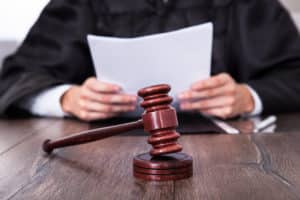Will My Los Angeles Personal Injury Case Go to Trial?

Whether your Los Angeles personal injury case goes to trial depends on your individual situation. The majority of personal injury claims are settled out of court between accident victims and insurance companies. Even if the injured party files a personal injury lawsuit, it does not necessarily mean the parties will take the case to court.
There are advantages to settling a case versus taking it to court.
Whether the advantages outweigh the disadvantages for each option depends on numerous factors. An experienced personal injury lawyer will consider all factors when determining whether accepting a settlement offer is the best option for your situation.
Table of Contents
Factors that Impact Whether Your Personal Injury Case Will Settle or Go to Trial

If the insurance company for the at-fault party accepts liability and is relatively confident that you could win the case if you go to court, it might be more willing to agree to a fair settlement amount. By settling the case, the insurance company could avoid trial costs, including attorneys’ fees and trial preparation.
The insurance company could also determine that the amount you demand for settlement is insufficient to fight about in court. On the other hand, the company could decide that the amount is fair and what would be expected if you went to court.
When deciding whether to settle injury claims, the insurance provider looks solely at the numbers. It determines whether a settlement or going to trial results in the best outcome for the company, which means paying as little as possible for your claim.
If the insurance company believes it can win by going to trial, it might decide that the risk of a jury trial is better than settling the claim.
Factors that could tip the scales in favor of a trial for the insurance company include:
- Your damages are very high because of catastrophic injuries or permanent impairments
- The insurance company believes you are partially to blame for the cause of the accident or injury (comparative fault)
- The company believes that it can win the case because the accident is excluded from coverage under the terms of the insurance policy
- The insurance company found a prior accident or injury that it believes caused your injuries (pre-existing conditions)
- The company alleges that you failed to mitigate damages, so it thinks it can lower the value of your claim by going to court
- The evidence proving that the insured caused your injury is circumstantial or weak
Even if it doesn’t make sense to you, the insurance company could choose to fight your claim. Many insurance companies have policies that guide their decision on whether to pay claims or take cases to trial. Those policies might have more to do with internal matters than legal theories.
What Happens if My Personal Injury Case Goes to Trial in Los Angeles?
If your personal injury case is one of the small number of cases that go to trial, you can expect it to go through the following phases:
Filing Pleadings
A personal injury lawsuit begins when the injured party files a complaint. The injured party is the plaintiff. The person being sued is the defendant.
The defendant has a specific deadline for filing an answer or response to the complaint. Generally, the insurance company hires a defense lawyer to handle the lawsuit and represent the insured in court.
Discovery Phase
The parties will engage in discovery. Discovery is the opportunity to gather additional evidence from the other party. It also allows each party to evaluate the strength and weaknesses of their case and the other party’s case.
Discovery tools include:
- Interrogatories (questions answered under oath)
- Deposition (testimony outside of court under oath)
- Request to Produce (list of documents to produce)
- Subpoena
- Request for Admissions (must admit or deny statements of fact)
If a party refuses to respond to discovery requests, the lawyer can file a motion to compel. The judge may order the party to comply with the discovery request unless the party has a valid legal reason for not providing the information, such as attorney-client privilege.
Settlement Negotiations
The parties can settle a personal injury lawsuit at any time during the process before the jury returns a verdict. However, many parties engage in settlement negotiations after completing discovery since they now have additional information that could affect their decision to settle the case or go to trial.
Pre-Trial Motions
Lawyers may file one or more motions before trial. Pre-trial motions generally address legal issues and questions of law. For example, attorneys may file a motion for summary judgment asking the judge to grant relief based on the pleadings, or they may argue that specific evidence should be inadmissible.
Jury Selection
Juries in personal injury cases have 12 members. The jurors are selected randomly from the jury pool convened for that court term. Each party may “strike” or dismiss up to six jurors without challenging the juror’s service for cause.
Trial, Verdict, & Appeals
During the trial, each side presents testimony and evidence for the jury to consider. The lawyers also make opening and closing arguments summarizing the facts and their arguments for or against a specific verdict.
The plaintiff presents their case first, followed by the defendant. The plaintiff has the burden of proving the legal elements to create liability.
Generally, a plaintiff must prove the elements of negligence:
- Duty of care
- Breach of duty
- Causation
- Damages
At the end of the trial, the jurors deliberate. The judge will inform the jurors before deliberation how many jurors must agree. The judge may order a mistrial if the required number of jurors cannot agree on a verdict.
In personal injury cases, if the jury rules in favor of the plaintiff, they also decide how much money to award for damages. However, if they rule in favor of the defendant, the plaintiff does not receive compensation for their damages.
Either party may appeal the jury verdict to a higher court. However, the party must have valid legal grounds for the higher court to overturn the decision in a personal injury case.
Schedule a Free Consultation With a Los Angeles Personal Injury Lawyer to Discuss Whether Your Case Will Go to Trial
Did another person cause your accident or personal injury? If so, contact our experienced LA personal injury attorneys at M&Y Personal Injury Lawyers or call 866-864-5477 for a free consultation. You’ll be able to discuss your case and get a better idea of whether it may go to trial.
